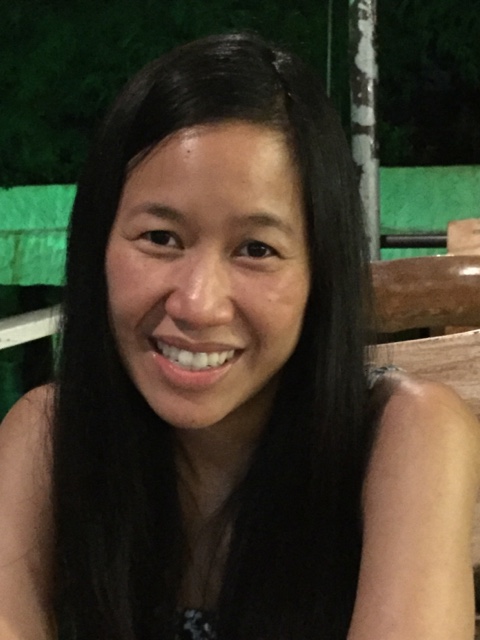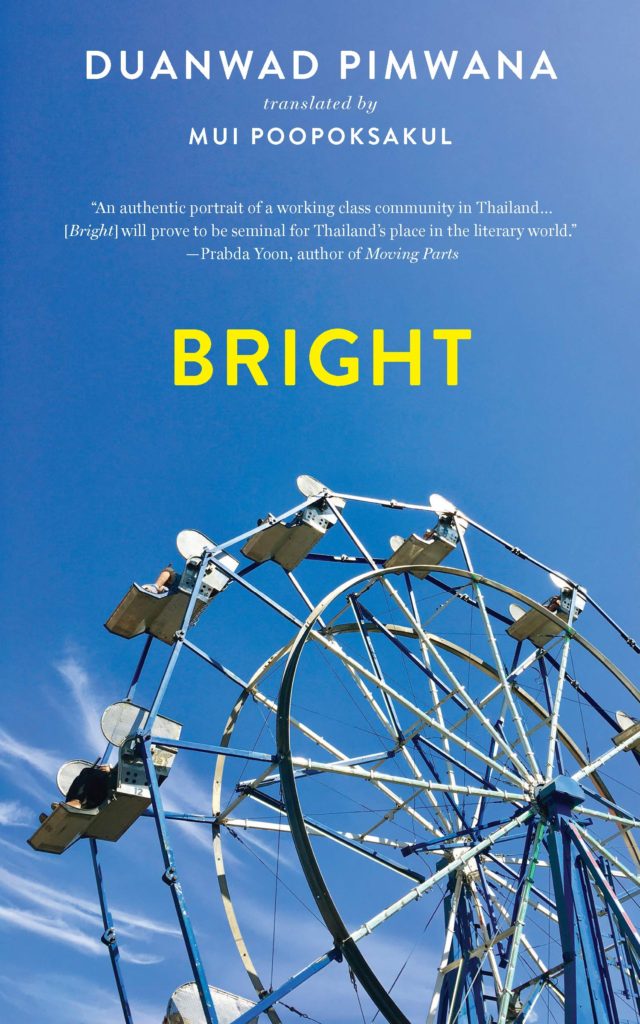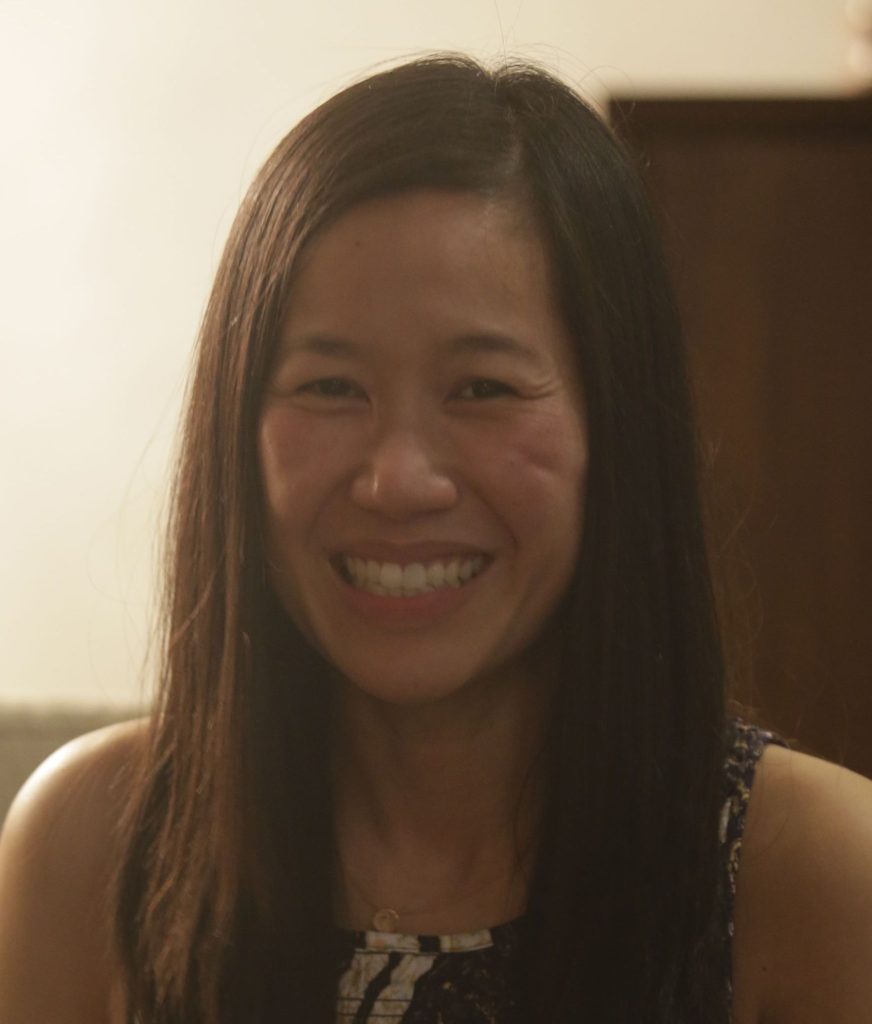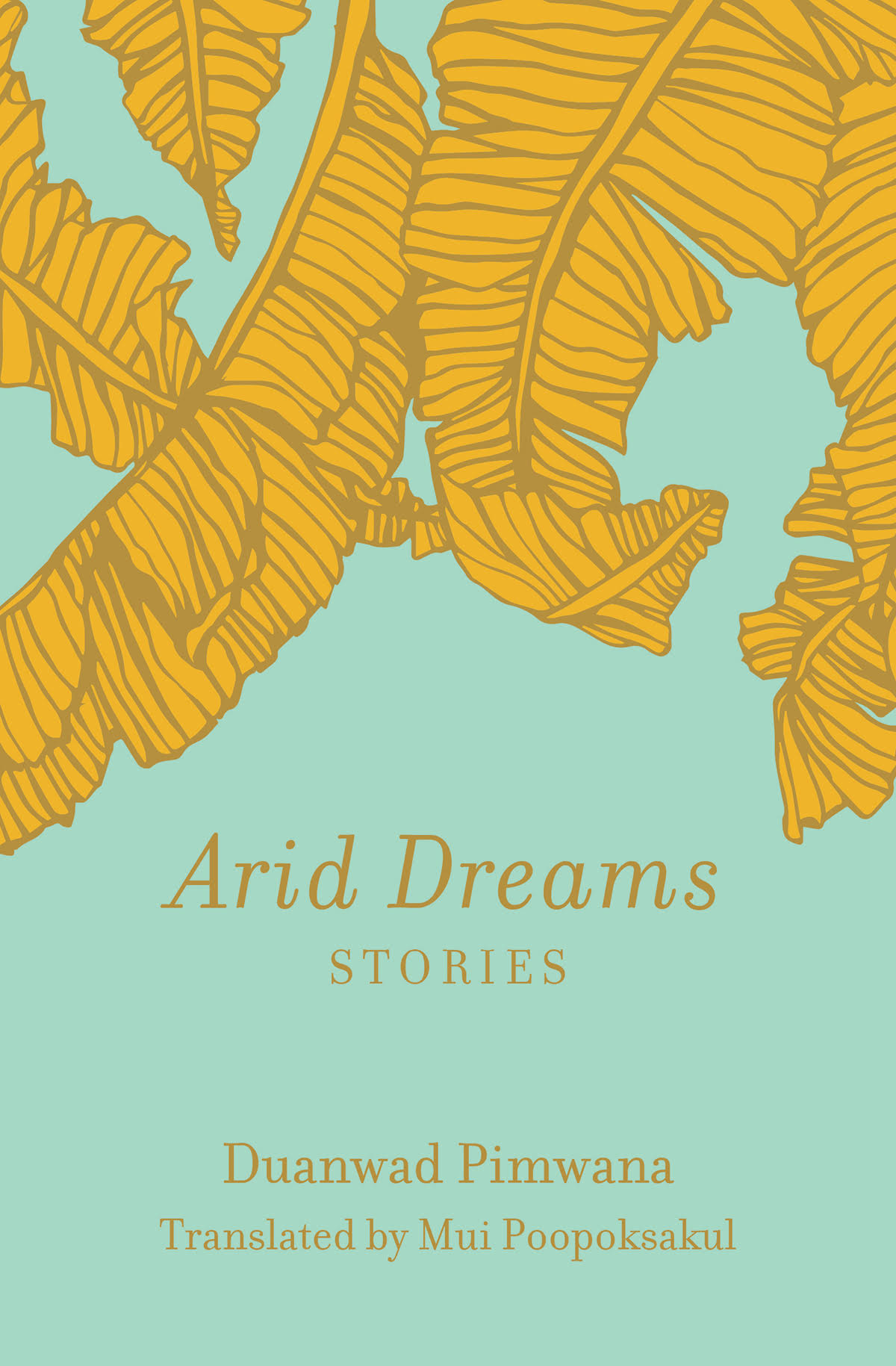Mui Poopoksakul is the translator of two books by Duanwad Pimwana– Arid Dreams and Bright, which were both published in April 2019. Although Pimwana is a prolific Thai author, these two books are the first time her work has appeared in English translation. Poopoksakul is interviewed here by APALA member Jennifer Chan.
Jennifer Chan (JC): Mui, I’m very excited for us to have the opportunity to chat about your two recent translations of Thai author Duanwad Pimwana, both her short story collection Arid Dreams and her award-winning novel Bright, which, thanks to your efforts, are now available in English for the first time.
Up until very recently, exposure to Thai literature in the West has been limited. You have quickly established yourself as a force when it comes to translating Thai works into English. In fact, you were named one of the “20 leading translators under 40” by Culture Trip. It might interest some of our readers to learn that you used to be a practicing attorney. Could you speak a bit about the transition from lawyer to translator? How did that come to pass? How do you perceive your role as translator?
Mui Poopoksakul (MP): First of all, thank you for your kind words! Yes, back when I lived in New York, I was a tax attorney at a downtown firm. People often think that means I used to fill out tax returns for a living, but that wasn’t what I did. A big part of the job was textual analysis, which is I think why a lot of people who studied something in the humanities (in my case, comparative literature) as undergrads are drawn to law school. Still, it was quite a departure. I liked being a lawyer just fine, but I couldn’t see myself doing it (or only it) for the rest of my working life, so I went back to school and did an M.A. in cultural translation at the American University of Paris, and my first book-length translation, The Sad Part Was by Prabda Yoon, grew out of my thesis project.
As a translator from Thai, I hope that my work is the start of something bigger as far as bringing Thai literature to the attention of a larger audience, not because Thai writers need that validation but because they have things to say. I also see myself as a member of the literary translation community that is making writing from different countries accessible.

JC: Before we get into your process for translating these works, I thought we might spend some time to introduce readers to Pimwana. What can you tell us about Duanwad Pimwana? How did you come to translate not just one, but two of her works?
MP: Duanwad Pimwana is one of the very few established female writers to come out of the Thai social realist tradition. Her body of work explores not only class issues but also human instincts and relationships as they are framed by the rules and forces of society. She cites John Steinbeck and Guy de Maupassant as some of the western writers who inspire her. She has authored nine books. So far, she has published more story collections than anything else, but in Thailand her single best-known work is probably the novel Bright because it won the S.E.A. Write Award, which, I’m told, is the only literary award that affects sales in Thailand. She’s currently working on two novels, one political and the other a love story.
Initially, I thought I would try to get Bright off the ground first, not only because I love this book, but also because I thought it would be easier to get a novel picked up. But as luck would have it, I met Lauren Rosemary Hook, my editor at Feminist Press, at the London Book Fair, and she asked me all about Pimwana, and I told her about the author’s many short stories—I always thought I would try to pitch a story collection of hers next—and we wound up developing the Arid Dreams project together.
JC: I’d like to take this opportunity to discover more about how you translate these works that provide wonderful glimpses into Thai culture. What can you share with us about your process?
MP: I’m most definitely not a translator who can translate a book without having read it first. I don’t think I could bear the thought. Also, Thai is not a language that editors can read generally, so I have to pitch the books. My first draft is horrifically messy—full of notes, questions, different options. It’s meant for my own eyes only. I also look up words, usually in the Thai Royal Institute Dictionary, at this stage, so the first draft is slower than you’d think. I usually finish my second draft before I go through my initial set of questions with the author, just to make sure I’ve thought about my own queries sufficiently, then edit and edit and edit from there, trying to look at the Thai less and less.
JC: One of the aspects that struck me about your style of translation is your choice to not translate certain terms into English. An example that quickly comes to mind is “kawgrachow,” from the title story in Arid Dreams. How do you decide what does and doesn’t get translated?
MP: In all the book-length translations that I’ve done, there are a few Thai words left in, but if you ask me, I think there are actually very few. I wish I had a more elegant and theoretical answer, but I use a gut-feel test: I ask myself, if I were telling my American friends a story involving this thing, would I say, there’s a Thai thing called this and then go on with my story, or would I just tell my story without making that note? Also, I do use a translator’s trick called “glossing,” which is to add in a few explanatory words around the foreign word left in, to give readers a sense of what the word means. For example, in the case of the kawgrachow top in the title story “Arid Dreams,” I did covertly put in some descriptive words like “sleeveless” to help readers visualize it even without the help of Google (while at the same time signaling to them that it’s a specific type of Thai top we’re talking about—kawgrachow is the name of this kind of top). Plus, you know, I get to try out these words on my editors first!

JC: I’m personally a fan of the format, but short stories have long taken a backseat to the novel in terms of popularity in the United States. Is the short story format particularly popular in Thailand? Did you choose the stories in Arid Dreams, or was the selection and arrangement original to Pimwana?
MP: Yes, Thai authors on the whole write more story collections than novels so there are more of them to choose from. I had an interesting conversation about this with the veteran Thai editor Suchart Sawasdsri when I interviewed him for Words Without Borders, and he thinks that in Thailand short stories have enjoyed a greater level of creativity partly because for a long time most novels were serialized. This is changing, though.
The stories that make up Arid Dreams are newly selected, but eight out of the thirteen are from the same Thai collection called Nungsue Lem Song, which means “The Second Book”, though, ironically, it was her first. The story “Arid Dreams” is actually the title story of another Thai collection. I helped choose the shorts in Arid Dreams by suggesting a list of potential stories to include. From there, my editor at Feminist Press and I discussed the selection together.
JC: I’ve read that you fought for the opportunity to translate Pimwana’s award-winning novel, Bright. What was it about Bright that made you feel compelled to translate it?
MP: I remember saying to my husband immediately after I finished Changsamran (the Thai of Bright), “I’ve found my next project.” The novel really charmed me with its folktale-like episodes, and I love the structure of it not only for this little boy’s story but also as a way to capture the mood of life. The way Pimwana put it was, the light moments in life keep you going but they pass. On a personal level, if translators got to dedicate books, I’d dedicate this one to my dad. Not only did he grow up in a similar milieu as the kids in the novel, but the book captures the spirit with which my dad tells his childhood stories.
JC: Pimwana has never been published before in the US, despite being widely acclaimed in southeast Asia. Do you have thoughts about why Thai literature is so seldomly available in English translation?
MP: I think the answer is complex, and Thailand is hardly alone in this. I would think it’s a confluence of different factors. Why do people from one country traditionally find another country (and its literary tradition) interesting or relevant or worthwhile of their attention? That’s one big question on the demand side. Related to that, Thai is also not a language that many non-Thais can read so that presents an obstacle at various stages in the process of getting rights picked up. I give my editors and presses a ton of credit for being so gutsy. On the supply side, there’s still very little support for translators’ work in Thailand so it’s hard for people to see it as a viable career option.
JC: Also, I would be remiss not to bring up libraries and librarians. You’re being interviewed by a(n academic) librarian for a primary audience of progressive Asian American librarians. What are your thoughts on libraries and their role in supporting diverse communities?
MP: I think libraries can be such a force. We didn’t really have community libraries when I was growing up in Bangkok, but I’m thinking right now of a newish space I learned about last year called The Bangkok Reading Room—I actually met the founder in another library! I really want to give this little library a shout-out because I think they’re doing such great work (they’re a non-profit), and it’s right in the neighborhood where I grew up. They have primarily art and theory books, books that are hard to find in Bangkok, but not only that, they host really hard-hitting, consciousness-raising talks. The space is really community-building, and they’re a great example of what a library can be.

JC: I’m sure our readers would love to know what you are reading. Are there any authors you would recommend, or books you’re excited about?
MP: One of the best books I’ve read of recent is Nina MacLaughlin’s memoir Hammer Head, and I’m not just saying this because we’re doing an event together in Boston. It’s beautifully written, and you actually gain concrete knowledge from this book—about measurement systems and such, things that are all around you but that you’ve never paused to think about—and I love the tender awareness of eventual death that’s a thread in the book.
For this spring and summer, I’ve vowed to read more southeast Asian authors. Two titles I’m looking forward to are Sergius Seeks Bacchus by Norman Erikson Pasaribu (translated from Indonesian by Tiffany Tsao) and Bangkok Wakes to Rain by Pitchaya Sudbanthad.
JC: Now that both Arid Dreams and Bright are out, what can we look forward to from you next?
MP: I can’t say for sure yet, but I hope there will be more Prabda Yoon and more Duanwad Pimwana down the line!
You can follow Mui on Twitter at @muipoopoksakul
Editing assistance provided by Shanna Kim.

